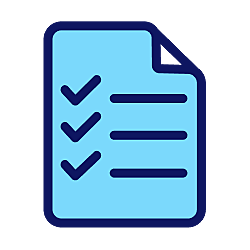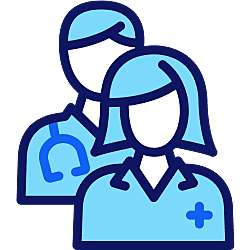Coronary Heart Disease Treatment
Get your coronary heart disease treatment online with free and fast delivery.
Prices from £14.99
Simply select your medication and fill in a brief questionnaire. One of our doctors will review your request and issue a prescription if it's suitable for you.
CHD is a common yet serious condition that's caused by your heart's blood supply becoming blocked or interrupted by fatty substances building up in your arteries.
We offer a range of different treatments for CHD that we can deliver to your door if you have already been diagnosed with the condition and prescribed the treatment by your doctor.
Our service is right for you if:
- you’ve been diagnosed with CHD by your doctor and you’re already receiving treatment
- your condition is stable with your current medication
- you’re under annual review with your doctor
And what it offers you is:
- you can get your repeat prescription online instead of visiting your GP practice
- your medication is delivered straight to your door
- you get access to free advice from a registered doctor about your condition and medication whenever you need it
If you are not currently receiving treatment and are worried you may have CHD, you should book an appointment with your GP to see if you need any further investigation.

In stock. Prices from £19.99

In stock. Prices from £14.99

In stock. Prices from £19.00

In stock. Prices from £18.00

In stock. Prices from £18.00

In stock. Prices from £29.99

In stock. Prices from £19.99

In stock. Prices from £34.99

In stock. Prices from £29.99

In stock. Prices from £19.99

In stock. Prices from £19.99

In stock. Prices from £24.95

In stock. Prices from £29.99

In stock. Prices from £19.99

In stock. Prices from £19.99

No results found.
Please check your spelling or try another treatment name.



About coronary heart disease
-
-
‘Cardiovascular disease’ is a term used to describe all diseases that relate to the heart and blood vessels. Coronary heart disease (CHD) is one of these diseases, and it occurs when the blood vessels supplying your heart become blocked or narrowed.
CHD is sometimes referred to as ischemic heart disease (IHD) and coronary artery disease (CAD). It’s also one of the leading causes of death in the UK. However, more recently, these rates have got lower thanks to more awareness and treatment. But, even with this improvement, CHD still remains a widespread and dangerous disease.
-
-
Due to how serious of a disease CHD is, doctors tend to look at the more severe symptoms to diagnose, as they are more common across different patients. However, there are subtle symptoms that will differ from person to person. It’s essential to recognise the symptoms of CHD as the sooner you can identify them, the faster you can get the appropriate treatment.
The three most common signs of CHD are:
Angina
Angina is caused by reduced blood flow to the heart due to blocked or narrowed arteries and often causes severe chest pain. This pain may feel tight, or like something very heavy has been placed on your chest. Sometimes this feeling can spread to other parts of your body such as the arms, jaw and back. Angina is not necessarily life-threatening, but it is an indicator of a serious condition, such as CHD. Angina most commonly occurs during exertion, but it tends to settle when resting. If you experience angina and it continues for longer than 5 minutes, please call 999.
Heart failure
Heart failure is when your heart can not pump blood around the body effectively. CHD can make your heart weaker as its walls can lose their strength or become stiff. If you have heart failure, it does not mean that your heart has completely stopped working altogether but it might mean that it needs more assistance to do its job.
Heart attack
Heart attacks happen when the blood flow to your heart is suddenly interrupted. This is usually caused by a blocked artery or blood clot. Heart attacks can cause life-long damage to your heart muscle and in some cases, be fatal. If you think you’re experiencing a heart attack, call 999 immediately.
What does a heart attack feel like?
A heart attack usually feels like your chest is being squeezed or pressed down on by an extremely heavy object. This pain, or pressure, can spread down your left arm and up to your jaw. You may also feel:
- light-headed
- dizzy
- nauseous
- cold and clammy
- hot and sweaty
- short of breath
Heart attack, or indigestion?
Sometimes the symptoms of a heart attack can be confused with indigestion, and while this may seem strange, it does happen frequently and can lead to people not getting the right support. The most common differences between the symptoms of a heart attack and indigestion are:
- indigestion usually occurs after eating, but a heart attack can happen at any time
- indigestion can be relieved by ant-acid medication, and a heart attack will not be
- heart attacks are unlikely to make you burp or cause bloating, and indigestion will
If you have a tight chest, shortness of breath and feel lightheaded, call 999 immediately.
What are the early signs of coronary heart disease?
If you know the early signs of CHD, you can take action before it develops by making some healthy lifestyle changes.
The most common early signs of CHD are:
- discomfort in the chest
- shortness of breath (usually when not exercising)
- a new irregular heartbeat
- high blood pressure
- a family history of CHD
These early warning signs could also indicate another condition or be the result of smoking, eating an unhealthy diet or a lack of exercise.
-
-
CHD is caused by a narrowing or blocking of the arteries that lead to your heart. This usually happens because of plaques forming in your artery walls which are known as Atherosclerosis.
Plaque in arteries
The plaques that narrow or close arteries are usually the result of various substances in the blood that can build up over time. These include calcium, fat, cholesterol, and fibrin. When plaque builds up, this can cause the cells in your artery walls to multiply, which can cause more blocking.
Atherosclerosis
This is when atheroma (plaques) form in the walls of your arteries and grow. This can cause your artery walls to harden, which can lead to an increase in blood pressure which increases the chances of having a heart attack later on in life.
Coronary heart disease risk factors
There are a lot of different factors that can increase your chances of developing CHD. Many can be avoided with healthier lifestyle choices, but others can be caused by an underlying condition that may not be as treatable. The more aware you are of the different risk factors that can lead to CHD, the easier it can be to take steps towards avoiding them.
How does smoking cause coronary heart disease?
Smoking is a significant risk factor for developing CHD, and smokers can be up to 4 times more likely to develop heart diseases than people who don’t. His is because there are many chemicals in cigarettes that can have a negative impact on your heart’s health.
Chemicals such as nicotine and carbon monoxide put a strain on the heart when they’re inhaled, causing your heart to beat faster in response to them. Some chemicals in cigarettes may also damage your arteries, increase blood pressure, and lead to a buildup of plaque. Smoking can also increase your risk of blood clots, which can lead to a heart attack or stroke.
How does high cholesterol cause coronary heart disease?
High cholesterol can lead to a buildup in your arteries which increases your likelihood of developing CHD. Cholesterol is a type of fat made by your liver, and while required in moderation for a healthy diet, too much can cause an increased strain on your heart. High levels of cholesterol are most commonly caused by an unhealthy diet or an underlying condition.
How does high blood pressure cause coronary heart disease?
When you have high blood pressure, it can put additional strain on your heart as it will have to work harder to pump blood around your body. This extra pressure can put stress on the walls of your arteries, which can weaken them or damage the lining. Weak or damaged arteries are often more likely to narrow and get blocked by a buildup of plaque.
How does obesity cause coronary heart disease?
Obesity can lead to a buildup of fat in your artery walls. This can lead to them becoming blocked, which makes you more likely to develop CHD.
How does diabetes cause coronary heart disease?
Diabetes often causes the lining of your blood vessels to get thicker. This can increase your chances of plaque building up in your arteries. High levels of blood sugar often lead to diabetes, which can more than double your chances of developing CHD.
-
-
Diagnosing CHD usually consists of two parts. The first part tends to be a ‘risk assessment’ which your GP will carry out to estimate your likelihood of developing CHD. This can involve blood tests, blood pressure tests and investigation into your family medical history and your lifestyle.
If your doctor thinks the results of your risk assessment show that you’re likely to develop CHD, and if you have symptoms, they will refer you for further testing for a formal diagnosis. These tests may include:
- electrocardiogram (ECG)
- exercise stress tests
- x-rays
- coronary angiography (using chemical dye to identify blocked arteries)
- radionuclide tests (a scan used to diagnose blood and heart disease)
- MRI scans
- other blood tests
How are blocked arteries diagnosed?
Blocked arteries are diagnosed after an angiography, MRI, or CT scan. Before this a doctor will complete a risk assessment, checking your blood pressure and cholesterol levels. Your lifestyle and family history will also be taken into account.
How can I check if my arteries are clogged?
It’s hard to check if your arteries are clogged because of where they are inside your body. People will usually find out that they have clogged arteries because they will get symptoms and visit a GP. If you are concerned about having clogged arteries, you should make an appointment with your GP.
Can an ECG detect a blocked artery?
An Electrocardiogram (ECG) is a test that measures the electrical activity of the heart. This includes your heart rate and the regularity of your heartbeat. These measurements can detect an irregular heart rate, see if you are having a heart attack or have had one in the past or find out if one side of your heart is pumping more effectively than the other.
-
-
Effective treatment for CHD usually involves medication, lifestyle changes and in some instances, surgery. The right treatments for CHD will help you manage painful symptoms, reduce the risk of your condition worsening and improve your heart's health and performance.
To start receiving treatment for CHD, you need to book an appointment with your GP. If you get diagnosed, there are a variety of different medications available to help treat the condition, such as:
ACE inhibitors: These block the activity of a hormone which can cause your blood vessels to narrow. This can improve your blood flow and lower your blood pressure.
- Ramipril
- Lisinopril
- Perindopril
- Enalapril
Angiotensin-receptor blockers (ARBs): These work in a similar way to ACE inhibitors as they improve blood flow and lower high blood pressure. ARBs may also produce fewer side effects.
- Candesartan
- Losartan
Calcium channel blockers: These medications relax the muscles in your artery walls, which can allow them to widen. This can lower your blood pressure and increase your blood flow.
- Amlodipine
- Felodipine
- Lercanidipine
- Nifedipine
Beta-blockers: These are usually used to treat high blood pressure by stopping the effects of a particular hormone in your body. This slows down your heartbeat and widens your blood vessels which can improve blood flow.
- Atenolol
- Bisoprolol
- Metoprolol
Other medications
- Aspirin
- Glyceryl trinitrate sublingual tablets
- Glyceryl trinitrate aerosol sublingual spray
Please note that we do not provide diagnosis for CHD and can only prescribe medication if you have already been prescribed it by your GP.
Can you treat clogged arteries without surgery?
There are a few methods to treat clogged or narrowed arteries without surgery, such as:
- coronary angioplasty: using a catheter, a special balloon is gently inflated inside an artery. This widens the artery and improves blood flow
- stents: this is a mesh tube that holds the artery open enlarging it. This is normally used following a coronary angioplasty
- medicines that can help improve blood flow to the heart muscle.
Can plaque in arteries go away?
There is no way to make the plaque in your arteries go away without an endarterectomy, but the side effects caused by a plaque build-up can be treated by improving your lifestyle and diet.
If you have plaque in your arteries, you can’t fix it, but blood flow can be improved with a combination of medication and healthy lifestyle changes.
How to prevent coronary heart disease
It’s important to take steps to prevent CHD early so you can stay healthy now and in the future. Here are a few ways you can avoid or minimise the risk of developing CHD:
- eat a healthy diet: Eating a low-fat, high-fibre diet is helpful. You should avoid saturated fats and salt and eat more fruit, vegetables and unsaturated fats
- be physically active: exercising is key to keeping your heart healthy and maintaining a healthy weight
- give up smoking: smoking can seriously damage your hearts health and put additional pressure on it.
- drink less: binge drinking or long-term drinking above the recommended limits can massively increase your risk of having a heart attack
- maintain healthy blood pressure: exercise regularly, eat healthily and - if necessary - start taking medication

Dr Babak Ashrafi Clinical Lead for Service Expansion
Accreditations: BSc, MBBS, MRCGP (2008)
Babak studied medicine at King’s College London and graduated in 2003, having also gained a bachelor’s degree in Physiology during his time there. He completed his general practice (GP) training in East London, where he worked for a number of years as a partner at a large inner-city GP practice. He completed the Royal College of GPs membership exam in 2007.
Meet our doctorsLast reviewed: 22 Oct 2020
-
Coronary heart disease, National Health Service [accessed February 2023]
-
Coronary artery disease, Mayo Foundation for Medical Education and Research (MFMER) [accessed February 2023]
-
Coronary Heart Disease, Diagnosis, National Heart, Lung, and Blood Institute (NHLBI) [accessed February 2023]





